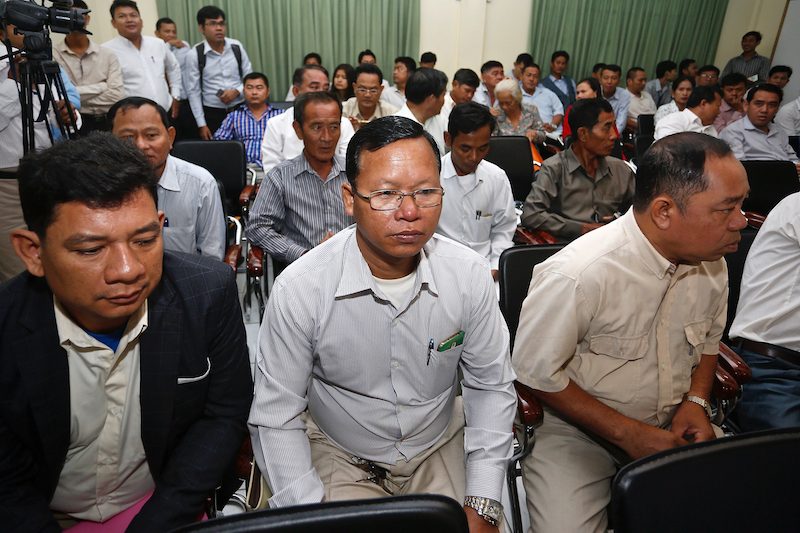Hundreds of registered voters are being called in to a tribunal set up at the Interior Ministry compound in Phnom Penh this week to face questioning about whether they are Cambodian enough to participate in upcoming elections.
In a campaign led by the opposition CNRP, hundreds of complaints have been lodged with the National Election Committee (NEC) claiming that foreigners—mostly from Vietnam—have been registered despite lacking citizenship.

Before a panel of NEC officials at the committee’s headquarters in the ministry’s Building H, the complainants and the challenged have been taking the stand one by one this week to argue the validity of the potential voters’ rights to cast their ballots.
On Monday, complaints against 181 voters were heard and all were dismissed. Among those called to testify on Tuesday was Ky Sovang, a 43-year-old woman from Tbong Khmum province. She told the panel that she was born in Kratie province, and that her father was Khmer and mother Cambodian-Vietnamese.
“I am not Vietnamese,” Ms. Sovang said into a microphone. “My mother, she has the blood of Vietnamese ancestors, but I was born in Khmer country.”
Ms. Sovang said she had an identification card, family book—recording her relatives and where they have lived—and election cards from 1993 and 1998.
“I want to keep my right to vote because I am Khmer,” she said.
Vinh Ny, the commune chief of Memot district’s Tramoung commune, where Ms. Sovang lives, testified in Ms. Sovang’s defense.
“She has enough documents,” Mr. Ny said. “And we have known her for many years.”
Another woman brought before the tribunal on Tuesday, Ek Samnang, from Phnom Penh’s Russei Keo district, appeared to take offense at the CNRP’s complaint against her.
“Why have you accused me of being Yuon?” she asked, using a sometimes derogatory term for Vietnamese. “I can speak three languages: Khmer, Chinese and English.”
“What real evidence is there to show I am Yuon?” she added.
Kak Komphea, a CNRP representative, maintained at the hearing that the accused were Vietnamese and should be struck from the election rolls.
“The reason is based on evidence: Our observers reported that they can’t speak Khmer well,” Mr. Komphea said.
The Khmer spoken by both Ms. Sovang and Ms. Samnang at the hearing on Tuesday was fluent.
Though accused of race-baiting, the opposition party has argued that its complaints are a matter of upholding the law, as monitors witnessed people being registered without official documents proving their citizenship.
Irregularities in the voter list were a major issue during the 2013 national elections, with duplicate, missing and “ghost” names thought to have numbered in the hundreds of thousands. Post-election negotiations between the opposition CNRP and ruling CPP put heavy focus on reforming the elections body and creating a new, clean voter list—a process that was realized last year from September through November using computers provided by the E.U. and Japan.
Koul Panha, executive director of the Committee for Free and Fair Elections, said the weeklong hearing for complaints about the new provisional voter list, released earlier this month, ensured transparency in the electoral process. Some of the cases were heard in absentia.
“It’s not easy, but we have to make sure that the party who complains is given transparency,” Mr. Panha said. “It’s more acceptable to them.”
(Additional reporting by Michael Dickison)



